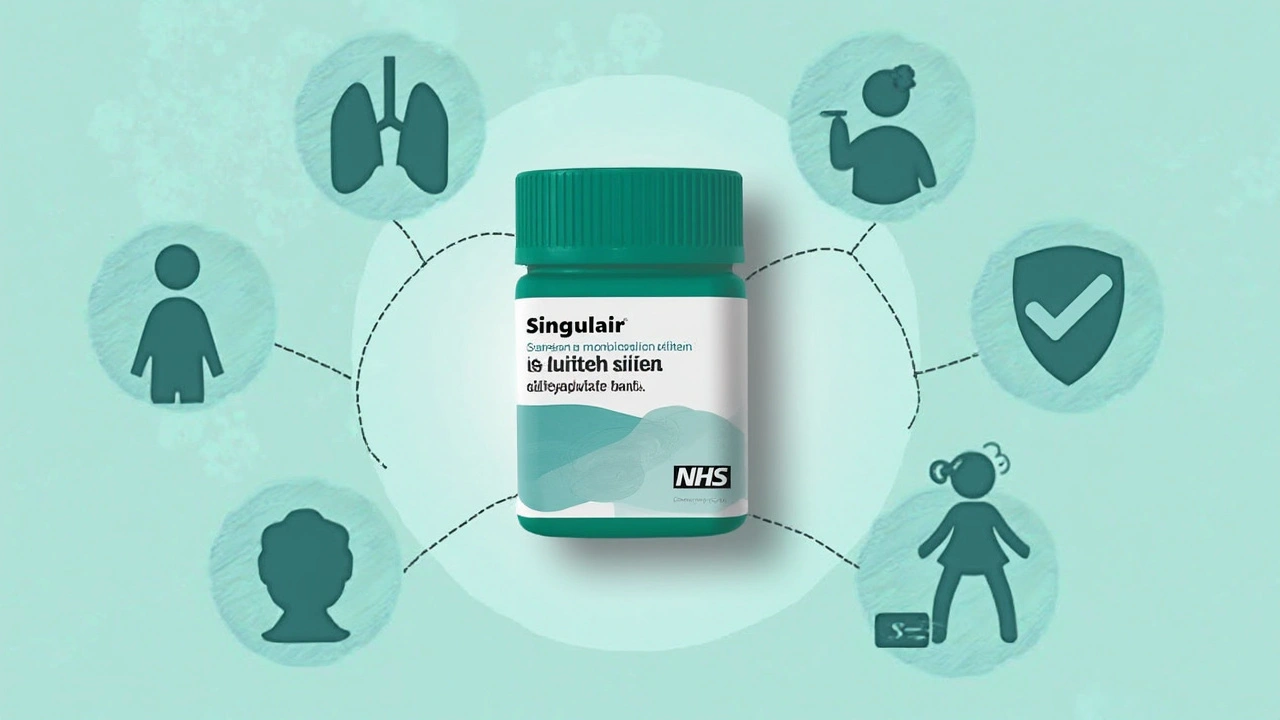Singulair: Uses, Side Effects, and Tips for Safer Asthma Relief

Jun, 6 2025
Picture this: Your kid can’t sleep because his nose won’t stop running, he’s coughing like a 40-year-old smoker, and the pollen count’s got Adelaide looking like a warzone. You’d do anything to help him breathe easier, right? That’s when doctors often mention Singulair—one of the most prescribed names in the world of asthma and allergy relief. But while it sounds like a magic fix, Singulair has a story that’s more complicated than most parents realize.
What Is Singulair, and How Does It Work?
Singulair is the brand name for montelukast, a medication originally developed to keep airways in the lungs open and allergies at bay by blocking leukotrienes, those pesky molecules that cause inflammation. It’s not a steroid. Unlike many inhalers, you swallow it as a tablet, chew, or sprinkle (even handy for stubborn three-year-olds). In Australia, GPs and specialists often prescribe Singulair to both kids and adults for asthma that acts up with exercise, at night, or because of allergies.
What sets Singulair apart is how it works—right at the root of the problem. Instead of just soothing symptoms, it blocks the chemical signals before they can make your lungs or nose go haywire. That’s why it’s sometimes called a preventer, not a reliever like Ventolin. Most people take it once daily, usually in the evening, to get ahead of overnight flare-ups.
The convenience is hard to beat. No awkward inhalers, no shakes, just a pill with water. The numbers back this up—over 23 million international prescriptions were written for montelukast last year, and in kids ages 2-5, it’s one of the first oral meds tried for seasonal allergies that mess with sleep or behavior.
But here’s the thing: Just because it’s easy, doesn’t mean it’s the right fit for everyone. Singulair doesn’t stop an asthma attack once it starts (always keep that inhaler close). It won’t cure allergies or create a superkid who can spend hours rolling in grass without a sniffle. Montelukast’s real power lies in prevention, especially for those who always seem to land in the emergency room every July or September.
You’ve also got chewables for the kids (think bubblegum flavor, but don’t let them treat it like lollies). And don’t fall into the trap of thinking more is better—the recommended dose is specific to age, so stick with the script.
| Singulair Fast Facts | Details |
|---|---|
| Active Ingredient | Montelukast sodium |
| Common Use | Asthma prevention, allergic rhinitis |
| Form | Tablets, chewable tablets, granules |
| Approved Ages in AU | Over 2 years |
| Prescription Rate in AU (2024) | Over 2 million/year |
Years ago, doctors hailed Singulair as a ‘gamechanger’ for asthmatic kids who dreaded steroid inhalers. But now, stories about weird mood swings and “zombie” behavior are popping up on parenting forums everywhere. That’s no accident—the medical community is treating it with extra caution these days, and any GP who prescribes it should ask about your kid’s mental health and family history too. More on that soon.

Risks, Side Effects, and the Real Talk
The big question—why the fuss? In the early 2000s, Singulair looked squeaky clean. Headaches, a few belly aches, maybe a rash if you got unlucky. But then came the stories: children suddenly anxious, having nightmares, or acting totally out of character. Sometimes adults noticed it too—outbursts nobody expected, sad moods coming out of nowhere, or trouble concentrating at work or school.
It wasn’t just in one or two families. In 2020, Australia’s TGA (the Therapeutic Goods Administration) sent out warnings about severe neuropsychiatric events tied to Singulair. The numbers weren’t sky-high, but high enough to make doctors everywhere hit pause and have a longer chat in the office before scribbling a script. The most common issues reported include:
- Mood swings, suddenly angry or low
- Nightmares or trouble sleeping
- Suicidal thoughts in rare cases (especially teens)
- Unusual dreams or hallucinations
- Restlessness, anxiety, or feeling on edge
- Physical: tummy pain, nausea, headaches
- Allergic reactions: rash, swelling, trouble breathing (rare)
Here’s the catch: These mental side effects can show up at any time, even after months on Singulair. No clear pattern, no quick blood test. That’s why so many parents now get warned from the start and asked to keep an eye out for changes in sleep, grades, or mood.
There’s lots of debate over how common the side effects really are, but Australian paediatricians usually estimate that 1 in 100 kids will have noticeable mood problems, and about 1 in 1,000 may have something more serious. Doesn’t sound massive, but if your kid is one of the unlucky few—trust me, you’ll notice.
So what do you do? Keep a diary for a few weeks after starting, and check in regularly. If your child starts acting strangely, don’t just wait it out or hope they’ll feel better after the soccer season. Call your doctor—sometimes just swapping out the medicine can make life return to normal. And don’t just stop suddenly unless your GP says so, especially during allergy season when symptoms might come roaring back.
Some tips to help things go smoothly if Singulair is on the table for your family:
- Take Singulair at the same time each evening, with or without food.
- Use a pill organizer or phone reminders to build a routine, especially during school term chaos.
- If your child is younger than 6, use the correct chewables or granules—no sharing doses or “doubling up.”
- Notice nightmares, mood swings, or odd behavior? Record what you see and chat to your doctor ASAP.
- Keep your action plan up to date—Singulair works best alongside (not replacing) emergency inhalers if things go pear-shaped.
Here’s something you won’t always hear: Some kids (and adults) do amazing on Singulair. The night cough disappears, mornings are clearer, and allergy sneezes drop off. But you never want to chase symptom relief at the cost of your kid’s mind or happiness. If the risks seem to outweigh the benefits (and for some families, they honestly do), ask about alternatives. You’ve got options, including nasal sprays, inhaled steroids, or different antihistamines that aren’t linked to mood problems.
Keep in mind, there’s no shame in pulling the plug if things feel off. For a few kids, simply stopping Singulair brings the old self back in days or weeks—something worth knowing before months go by fighting a battle you didn’t sign up for.

Making Singulair Safer: Practical Advice for Parents and Adults
Managing asthma or allergies is tough enough without second-guessing every change in your child’s (or your own) behavior. If Singulair ends up being the choice, you can stack the odds in your favor by doing a few extra things your pharmacist or GP sometimes skips in the two-minute consult.
First, loop in everyone who cares for your kid. Coaches, teachers, even the after-school sitter—just a quick heads-up to flag anything unusual, especially during the slippery winter-spring switch. I tell my son’s teacher to let us know if he seems more tired or moody than usual. You’d be surprised how many changes get picked up outside the home.
Second, learn your allergy and asthma triggers. For plenty of people in Adelaide, it’s wattle, olive trees, dust from footy training, or a killer cat dander cloud. Tracking when symptoms hit helps show if Singulair is making a real dent, or if it’s time to talk about something different. Layering medicines just adds to the confusion if you aren’t sure what’s working.
Third, don’t leave it all to the Google gods. Everyone’s experience is different. A neighbor’s horror story online might sound terrifying, but GPs actually go through a pretty thorough checklist now before prescribing. Have an honest conversation about your family’s mental health history, any past reactions to medication, and what you hope the medicine will do. Good doctors should weigh up the pros and cons with you instead of shoving a script in your face.
Fourth, stash a copy of your asthma or allergy action plan somewhere obvious—fridge, school bag, phone. If your kid’s on Singulair, write a note about possible side effects and when to call the doctor. These plans still save lives, especially when asthma gets unpredictable.
Let’s talk statistics for a sec. In 2024, doctors in South Australia actually cut back on new Singulair prescriptions by about 15% compared to peak years in the late 2010s, mostly because of growing side effect concerns. Kids under 10 made up the largest share, especially in families where steroid inhalers hadn’t worked well or were just too hard to use consistently. But for allergy-only cases with no asthma history, antihistamines and nose sprays are pushed first, reserving Singulair for the really stubborn cases.
Most importantly, if you or your child ever feels “off,” don’t try to push through just for the sake of easy symptom control. Doctors across Australia encourage families to stay in touch and reach out if anything feels wrong. Even though prescription medications can make a world of difference for chronic allergies and asthma, your gut feeling as a parent—or for yourself—matters more than a squiggle on a script pad.
| Common Triggers in Adelaide | Asthma/Allergy |
|---|---|
| Pollen (wattle, grass, olive) | Both |
| Dust from playgrounds | Asthma |
| Cat and dog dander | Allergy |
| Smoke from bushfires | Asthma |
| Mould after winter rain | Both |
There’s no one-size-fits-all answer when it comes to asthma and allergy relief—Singulair included. The medication has its place, and it’s made a real difference for heaps of families here and around the world. Just make sure you weigh the benefits against the risks, keep the conversation open, and use every tool in your kit to spot little changes before they turn into big problems. Your family’s health is worth every second you spend double-checking the details.
And if you ever find yourself stuck between two choices—like whether to switch your kid off Singulair or not—remember there’s no perfect solution. Even as a dad who’s been through the meds carousel with Thaddeus, I reckon the best results come from a mix of science, common sense, and really listening to your gut.
